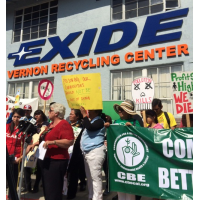State Reports Show Exide Leaking Hazardous Waste Far from Its Vernon Home
 Vernon Exide protest in April
Vernon Exide protest in April
Observers of the years-long battle over toxic materials emanating from Exide Technologies’ battery recycling plant in the Los Angeles County city of Vernon may have considered they were watching a hazardous scene from a very safe distance.
But according to media reports last week, the arsenic and lead battery waste that has plagued the low-income residents who live near the plant—and outraged environmental justice advocates—may be having a direct impact on a much wider geographic area.
A CBS Los Angeles investigation uncovered public documents from the state Department of Toxic Substances Control (DTSC) that indicate trucks leaving the plant are leaking their toxic materials onto streets and sidewalks, which would invariably lead to them being washed into the Los Angeles River via storm drains.
The Los Angeles Times published an April inspection report from the DTSC that documents multiple instances of observed leakage. One report, which mentions the CHP ticketing a truck in October 2013 for leaking materials, contains a handwritten note from a department inspector that says, “Leaking from the containers while on public roads is an ongoing problem and . . . needs to be addressed immediately.”
DTSC Chief of Enforcement Paul Kewin told CBS it was apparent the leaks had been going on for a long time and said, “I can’t explain how that got past us.”
Consumer Watchdog’s Liza Tucker said she could. “We have a regulator who, through a combination of clear ineptitude, bias toward industry and reckless disregard for human health, (that) has created a monster,” she said.
Things have been getting past regulators for awhile. The Times reprinted a 1990 report submitted to the EPA by the state that “found hazardous levels of lead leaking onto Interstate 5” from a Vernon Exide truck.
KPCC’s Exide timeline, tracing the plant’s substantial record of noncompliance with environmental regulations, opens with the plant’s use of perforated drain lines in 1999 to better dispose of lead particulates into the soil. That entry is followed by fines for improper storage of used lead-acid batteries in 2003, a 2007 study that found 1,500 pounds of lead deposited in the L.A. River watershed, air quality violations in 2009 and lots more.
The U.S. Environmental Protection Agency (EPA) filed a complaint in May that the smelting plant violated the federal Clean Air Act’s emission standards on more than 30 occasions. The agency said the violations occurred between March 22 and April 19, 2014, and additionally on or about September 9 and 18, 2013 and January 2-3, 2014.
When the plant is fully operational, it recycles lead-bearing scrap materials and 23,000 to 41,000 automotive batteries daily as a cheap source of lead for its battery-making facilities. It has been closed since March, although the owner has vowed to reopen after upgrading the facility.
The plant successfully fended off criticism for years until a South Coast Air Quality Management District (AQMD) report a year ago said 110,000 people were at higher risk of cancer because of the plant's arsenic emissions. The AQMD filed a civil suit for $40 million.
Exide has operated with a temporary permit for more than a quarter century, taking advantage of a permitting system that the DTSC admits (pdf) is regarded with “significant dissatisfaction.” State Senator Kevin De León, who was sworn in as leader of Senate on Wednesday, introduced Senate Bill 812 to set deadlines for closing hazardous waste facilities that violate health and safety laws while operating on expired permits.
Twenty-nine of the state's 117 facilities regulated by the DTSC don't have the proper permits to operate. The legislation passed but Governor Jerry Brown vetoed it.
–Ken Broder
To Learn More:
Public Documents Show Hazardous Waste from Exide Plant Spilled onto Highways, into Storm Drains (CBS Los Angeles)
Exide Hazardous Waste Dripped Onto Roads from Trucks, Records Show (by Tony Barboza, Los Angeles Times)
Exide Finally Gets Around to Cleaning Up Toxic Mess . . . at 2 of 39 Homes (by Ken Broder, AllGov California)
- Top Stories
- Controversies
- Where is the Money Going?
- California and the Nation
- Appointments and Resignations
- Unusual News
- Latest News
- California Forbids U.S. Immigration Agents from Pretending to be Police
- California Lawmakers Urged to Strip “Self-Dealing” Tax Board of Its Duties
- Big Oil’s Grip on California
- Santa Cruz Police See Homeland Security Betrayal in Use of Gang Roundup as Cover for Immigration Raid
- Oil Companies Face Deadline to Stop Polluting California Groundwater





